Artificial nesting platforms are supporting the ongoing recovery of European Dalmatian pelican populations in the Danube Delta and beyond.
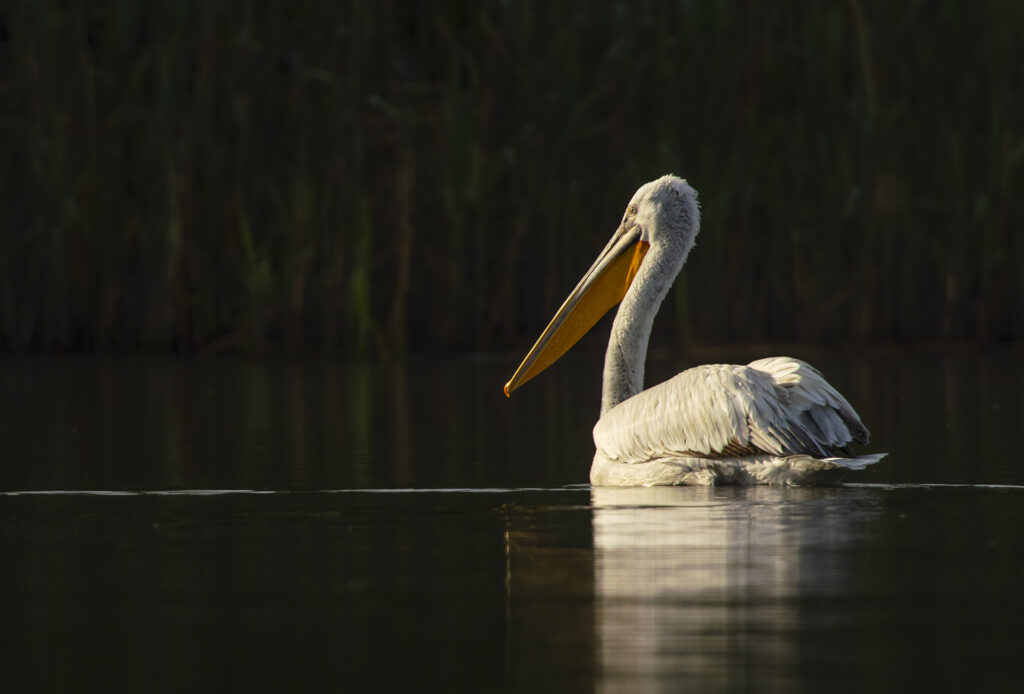
An endangered icon
The iconic Dalmatian pelican is a globally threatened species, with an estimated worldwide population of less than 20,000 individuals. Extremely vulnerable across its entire geographical range, the species has suffered a dramatic decline over recent decades, with the principal causes including collisions with power lines, habitat loss, disturbance, direct persecution by fishermen, and a lack of awareness amongst local communities, as well as avian flu. These threats, combined with a lack of scientific data, make the future of the Dalmatian pelican heavily reliant on conservation action.
Coordinated by Rewilding Europe, the Pelican Way of LIFE initiative kicked off in late 2019, with the aim of enhancing populations of the Dalmatian pelican in southwest Europe – including in the Danube Delta, one of the strongholds of the species. Partners in the initiative have been working to reduce the threats to the birds and improve their habitat at 27 sites across Romania, Bulgaria, Greece and Ukraine, as well as carrying out capacity building and research in Turkey, Albania, Montenegro, and North Macedonia.

A helping hand
Breeding sites of Dalmatian pelicans across the Balkans can contain anywhere between one and 250 nests, which are typically made of sticks, stones, mud, reeds, grasses, and feathers. Most colonies are located in open or slightly concealed areas, and comprise between 10 and 20 nests.
With natural Dalmatian pelican nesting sites increasingly damaged by storms, swamped by flooding, or disturbed by human activity, giving the birds a helping hand by providing secure nesting platforms that are largely inaccessible to predators has proven to be a highly effective method for supporting population recovery. Platforms that have been constructed in Bulgaria as part of the Pelican Way of LIFE initiative helped Dalmatian pelicans have a successful breeding season in 2023.
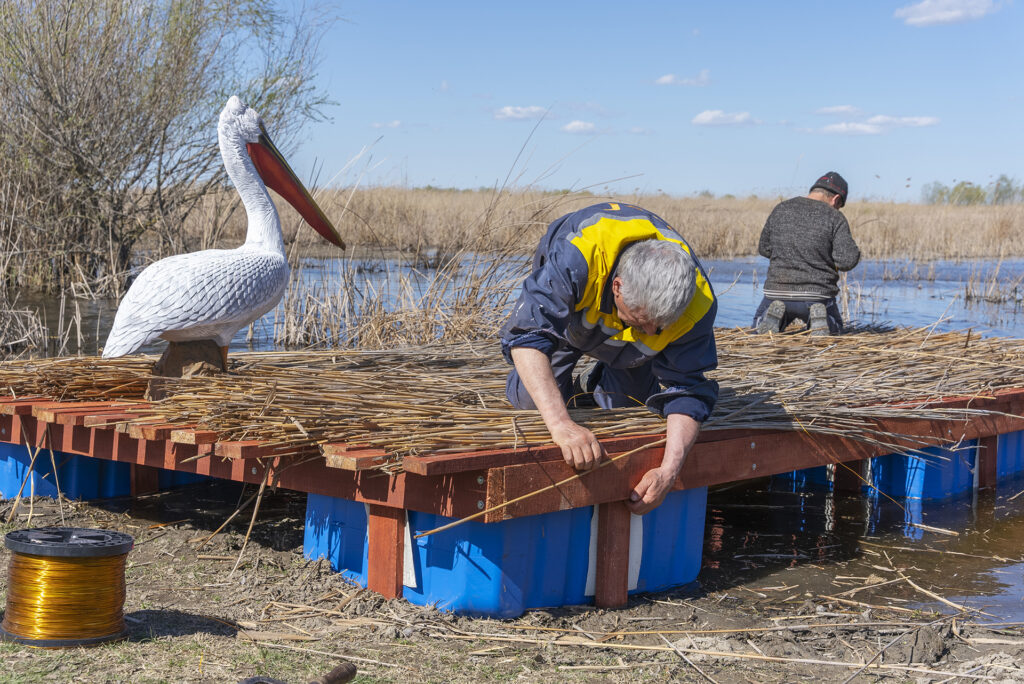
Platform progress
The Pelican Way of LIFE initiative has also seen the Rewilding Ukraine team construct a number of artificial nesting platforms in different locations across the Ukrainian part of the Danube Delta rewilding landscape over the last few years. The team have been unable to check the status of several of these platforms because of the ongoing war – on one of them, however, pelicans have been seen roosting.
To further aid Dalmatian pelican population recovery, one new platform has just been constructed on 3500-hectare Ermakiv Island in the Danube Biosphere Reserve. The work was carried out by the Izmail Department of Water Resources, with which the Rewilding Ukraine team has collaborated on practical rewilding efforts for many years. The platforms were covered in reeds and dummy pelicans installed, which should attract real pelicans to the structures.
As is the case in other countries, the aim is to encourage the birds to breed and thereby support the comeback of these gentle giants. The platforms, which mimic islands with vegetation, serve as temporary nesting sites until broader wetland restoration can take place. Around 80% of European wetlands have disappeared over the last century, while those that remain are largely degraded due to human pressures and highly vulnerable to climate change.
Towards breeding success
While more Dalmatian pelicans appear to be wintering in the Danube Delta, it has been many years since the species has successfully nested in the Ukrainian part. A few years ago, Ukrainian ornithologists recorded several nests of Dalmatian pelicans on Lake Kugurlui, but a stable nesting colony failed to develop.
“The birds now need to get used to the latest platform that has been constructed,” says Rewilding Ukraine communications officer Kateryna Kurakina. “We hope that they will firstly start roosting on it, and then build nests and raise chicks. We all have our fingers crossed that this happens on all the platforms we have built.”
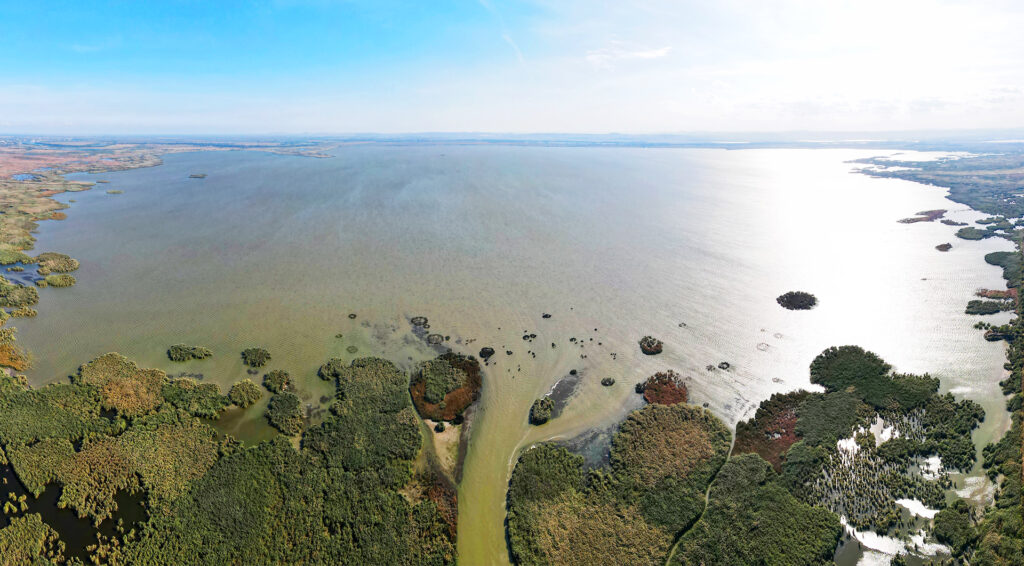
Bouncing back
Unfortunately, 2022 was not a good year for Dalmatian pelicans in Europe. A major outbreak of avian influenza – a highly contagious viral disease that occurs primarily in poultry and wild waterbirds – severely affected nesting colonies of the species in the Balkans and Romania. Greece, for example, lost almost 40% of its total Dalmatian pelican population, while cases of high mortality were also recorded in Albania and Montenegro.
Luckily, 2023 was a far more favourable year, with many Dalmatian pelican populations showing welcome signs of recovery. A breeding colony of Dalmatian pelicans formed in the Kalimok-Brushlen Protected Area near Tutrakan in 2021 had an exceptionally successful and record-breaking season, with 79 pairs successfully raised 107 young pelicans. In Persina Nature Park, 39 pairs successfully raised 54 chicks. Overall, in Bulgaria in 2023, a total of 128 pairs of Dalmatian pelicans nested, successfully raising 176 chicks. This mirrored positive trends in other countries.
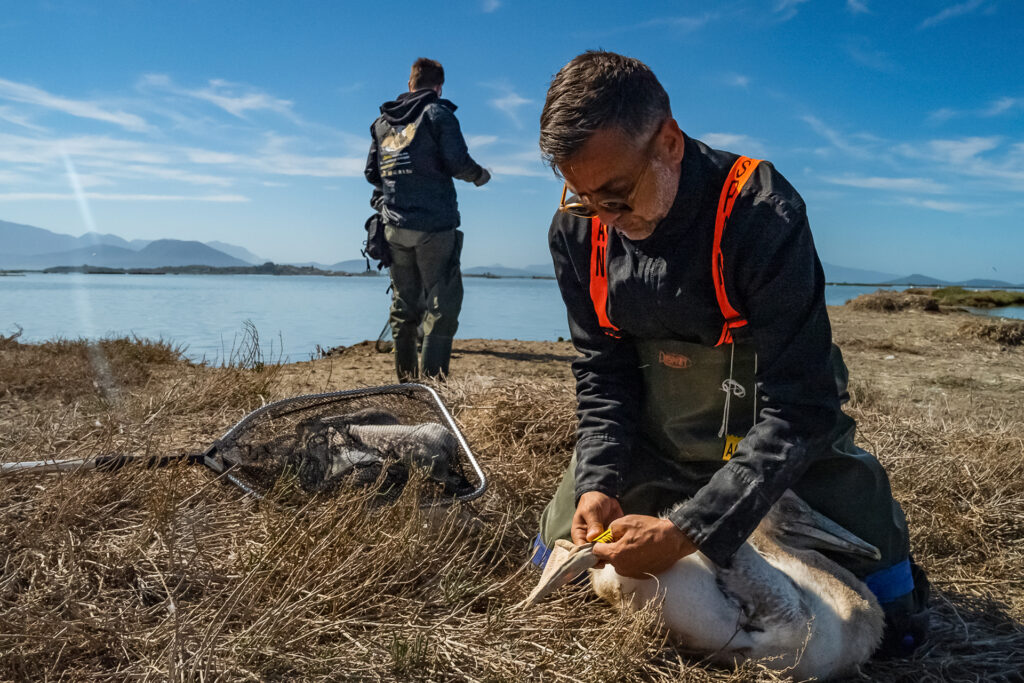
“In Bulgaria we have seen Dalmatian pelicans not only crowding onto platforms to nest, but also onto fallen trees, so it’s clear that the birds really lack suitable areas for building nests,” says Kateryna Kurakina. “This highlights the value of these platforms, and the fact that we need to continue efforts to help the birds nest – both through platforms, and habitat restoration.”
An international census of wintering Dalmatian pelicans took place on the Balkan Peninsula in late November and mid-December as part of the Pelican Way of LIFE initiative, to collect data on the number and distribution of the birds across the region. In Romania, a total of 949 individuals were counted, comprising 704 adults and 245 immature birds. This is the highest number of Dalmatian pelicans recorded in Romania during winter monitoring since the start of the initiative. Although a partial census was carried out in the Ukrainian part of the Danube Delta, the ongoing war meant a comprehensive count was impossible.
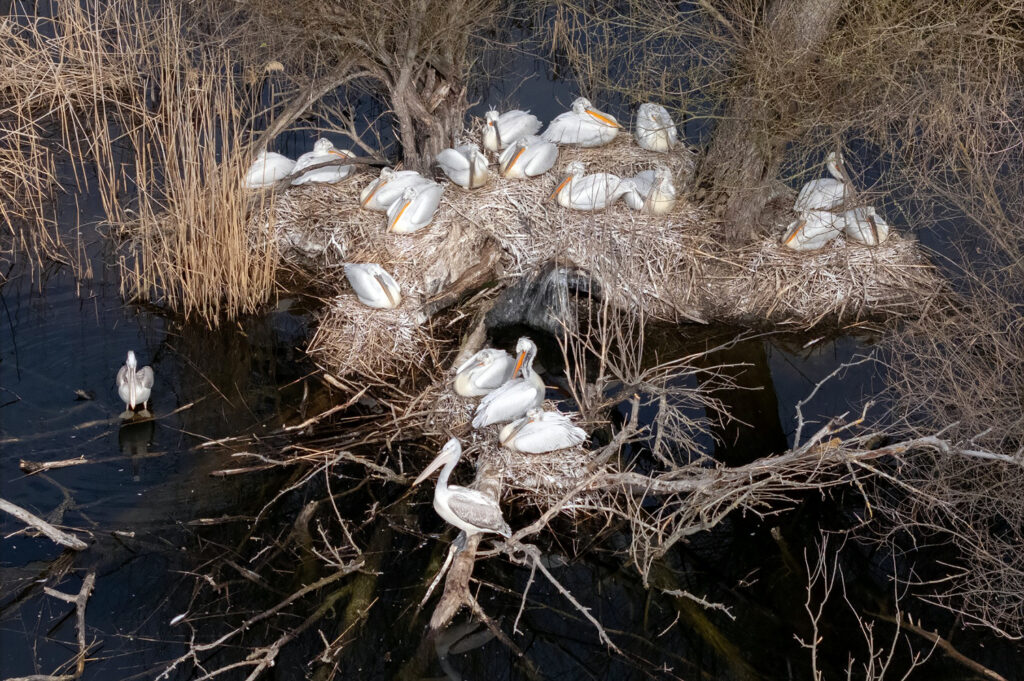
The bigger rewilding picture
The vulnerable Dalmatian pelican is one of the Danube Delta’s most iconic indicator species. This majestic bird requires access to still, fish-filled waters undisturbed by human activity, with extensive flooded and shallow water areas. Pelican populations in the delta were hit hard by the construction of a life-sapping web of dykes and agricultural polders between the 1950s and 1980s, which disconnected huge swathes of floodplain from the Danube’s main channels and lakes. This decimated fish stocks and impaired the ability of the river to provide water for drinking and irrigation, and to mitigate flooding.
To reverse some of the environmental damage, the Rewilding Ukraine team have been working hard to restore the natural flow of water in the Ukrainian part of the delta for the past few years. Their ongoing efforts, which are increasingly breathing new life into vast swathes of wetland habitat, will benefit both Dalmatian pelicans and people.
The Pelican Way of LIFE initiative is coordinated by Rewilding Europe and funded by the LIFE Programme of the European Union and the Arcadia Fund. In Ukraine, Pelican Way of LIFE efforts are carried out by Rewilding Ukraine and the Danube Biosphere Reserve, together with other local partners. Building engagement is essential to the success of pelican conservation measures, with Rewilding Europe organising an educational camp in June 2023 to connect schoolchildren from Ukraine, Romania, Greece, and Bulgaria with the birds.